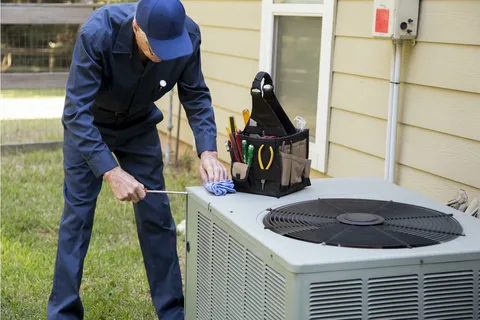Top Heat Pump Maintenance Tips Every Homeowner Should Know

A well-maintained heat pump can deliver reliable heating and cooling for years while keeping energy bills low. But just like any HVAC system, it needs routine attention to stay efficient, especially in Canada’s changing seasons. Whether you already own a heat pump or are planning to install one, understanding how to care for it can help you avoid unexpected breakdowns and costly repairs.
Why Regular Heat Pump Maintenance Matters
Unlike traditional furnaces or AC units, a heat pump works year-round, extracting heat in the winter and reversing the process in summer. Because it operates almost nonstop, it naturally experiences more wear and tear. Regular maintenance keeps components clean, ensures steady airflow, and helps maintain efficiency over time.
Homeowners who neglect maintenance often notice higher energy bills or reduced heating output during cold months. Professional inspections, like those offered through HVAC Near Me, can identify small issues early and prevent major system failures later on.
1. Keep Air Filters Clean and Unblocked
Airflow is key to any efficient heat pump system. Dirty or clogged filters restrict air movement, forcing your unit to work harder and consume more energy. Inspect filters monthly, especially during heavy-use seasons, and replace or clean them every one to three months depending on your model.
A simple filter change can improve air quality, reduce strain on the compressor, and help your system maintain steady heating and cooling throughout the year.
2. Clear Away Outdoor Debris
Because the outdoor unit pulls in air, leaves, snow, and debris can easily collect around it. Keep at least two feet of clearance around the exterior heat pump and gently remove any buildup from the top or sides. This ensures proper ventilation and prevents ice or dirt from blocking the coils.
During the winter months, it’s especially important to clear away snow or frost that can restrict airflow. For cold-weather setups, consider a raised stand or cover recommended by your technician to protect the system from snow accumulation.
3. Schedule Professional Inspections
Even if your system seems to be running fine, annual professional maintenance can make a major difference. During an inspection, a certified HVAC technician checks refrigerant levels, cleans the evaporator and condenser coils, tests electrical components, and verifies thermostat calibration.
Regular visits from a specialist help detect issues like refrigerant leaks or inefficient defrost cycles before they turn into bigger problems. You can schedule your seasonal tune-up easily through our Heat Pump Maintenance Services.
4. Watch for Signs of Trouble
Unusual noises, inconsistent temperatures, or a sudden increase in utility bills are all warning signs that your heat pump may need attention. A frozen outdoor coil or frequent short cycling often points to airflow restrictions or low refrigerant.
Addressing these problems early not only protects the unit but also improves its longevity. If you notice any of these signs, contact our experts for prompt heat pump repairs to restore performance before winter temperatures drop.
5. Adjust Your Thermostat Seasonally
Your thermostat plays a big role in keeping your system efficient. Use smart or programmable thermostats to automatically adjust settings between day and night. Avoid setting large temperature swings, as they force the heat pump to work harder.
For optimal performance, maintain moderate temperatures in both heating and cooling seasons, allowing your system to operate steadily rather than in frequent on-off cycles.
6. Don’t Skip the Defrost Cycle
Most modern heat pumps include a built-in defrost function that removes frost buildup from the outdoor coil. If you ever notice thick ice forming or the unit running unusually long in defrost mode, it could indicate a sensor or relay problem.
This is another reason regular service visits are valuable, technicians can ensure your defrost cycle activates properly and your system remains efficient even during freezing weather.
How Long a Well-Maintained Heat Pump Lasts
With proper care, a high-quality system can last 15 years or longer. Brands sold through reputable Canadian suppliers, like the models in our Heat Pump Products collection, are designed for durability and tested for cold-climate performance.
Preventive maintenance, including coil cleaning and refrigerant checks, is the best way to extend your unit’s lifespan and ensure you get consistent comfort year after year.
When to Call a Professional
If your heat pump isn’t keeping up with demand, makes unusual noises, or seems to run nonstop, it may be time to have it checked by a certified technician. A professional inspection can uncover hidden issues like airflow blockages, refrigerant leaks, or failing components before they lead to costly repairs.
Homeowners who prefer to stay ahead of problems can easily book seasonal heat pump service to keep their system running efficiently through every season.
Insights from HVAC Experts
Industry specialists often point out that many heat pump issues start with neglected maintenance. When filters aren’t replaced, coils stay dirty, or refrigerant levels drop too low, performance gradually declines, often without homeowners realizing it. Over time, this can lead to higher energy bills, uneven temperatures, or even premature system failure.
Regular seasonal checkups not only keep the system running efficiently but also protect the investment you’ve made in your home’s comfort. For homeowners interested in maximizing performance and energy savings, it’s worth learning more about the benefits of ductless heat pumps for Canadian homes.
